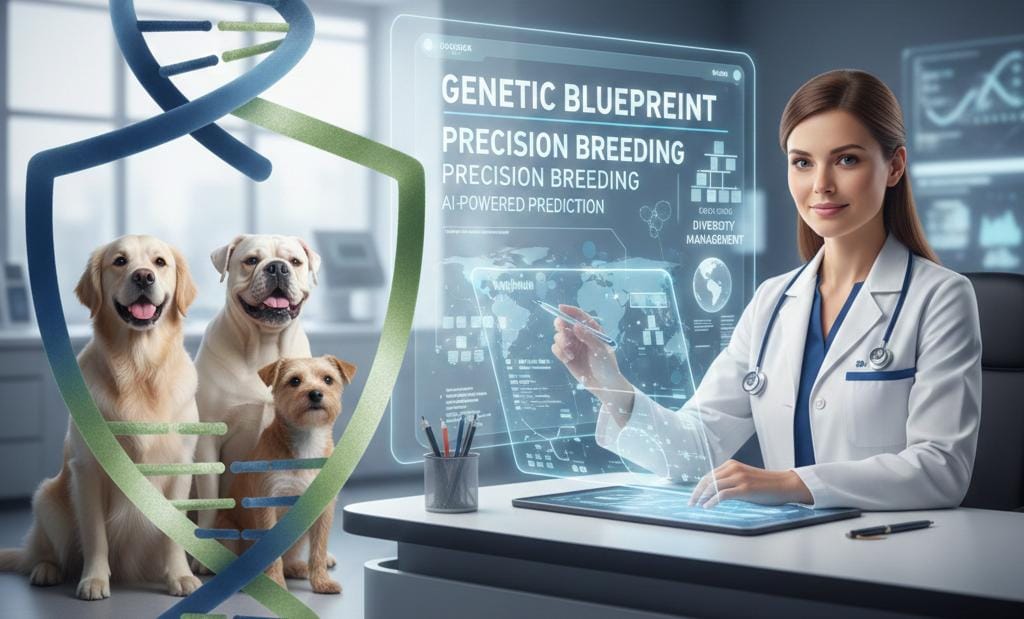Introduction
Genetic technology has created a revolutionary shift in modern livestock industry development. Modern livestock production experiences a revolution through CRISPR (clustered regularly interspaced short palindromic repeats) technology because traditional selective breeding methods no longer satisfy industry demands. Breeding animals with genetic improvements makes farming more sustainable and efficient, and it also makes the business more profitable.
The Role of Genetics in Livestock Production
Genetics plays a crucial role in livestock improvement by influencing traits such as:
- Growth rate – Faster-growing animals mean quicker market readiness.
- Meat and milk yield – Higher production ensures better profitability.
- Disease resistance – Reduces dependency on antibiotics and veterinary costs.
- Feed efficiency – Maximizes output while minimizing resource use.
- Climate adaptability – Helps animals withstand extreme temperatures.
CRISPR: A Game Changer in Livestock Genetics
CRISPR is a gene-editing tool that allows scientists to make precise changes in DNA. Unlike traditional breeding or genetic modification, CRISPR is faster, more accurate, and less expensive. Some groundbreaking applications include:
- Disease Resistance: Researchers have used CRISPR to develop pigs resistant to Porcine Reproductive and Respiratory Syndrome (PRRS), a disease that costs the swine industry billions of dollars annually.
- Hornless Cattle: CRISPR has been used to remove genes responsible for horn growth in dairy cattle, eliminating the need for painful dehorning procedures.
- Heat-Resistant Livestock: Gene editing is helping create cattle that can withstand high temperatures, essential for farming in tropical regions.
- Improved Meat Quality: Scientists have modified genes in pigs and cattle to enhance marbling and lean meat production, catering to consumer demands.
Scientists Behind CRISPR and Their Contributions
The development of CRISPR as a gene-editing tool is credited to two key scientists:
- Jennifer Doudna (American biochemist) – She is a professor at the University of California, Berkeley, and played a major role in discovering how CRISPR-Cas9 could be used for gene editing. She was awarded the 2020 Nobel Prize in Chemistry for her work.
- Emmanuelle Charpentier (French microbiologist and geneticist) – She co-discovered CRISPR-Cas9 with Doudna and has worked extensively on bacterial genetics and molecular biology. She is also a recipient of the 2020 Nobel Prize in Chemistry.
Other scientists who have contributed significantly to CRISPR applications in livestock include:
- George Church (Harvard & MIT geneticist) – He has worked on improving CRISPR for precise gene-editing in mammals, including livestock.
- Feng Zhang (Broad Institute, MIT) – He contributed to optimizing CRISPR technology and making it applicable to animal and human genetics.
Beyond CRISPR: Other Genetic Innovations
While CRISPR is at the forefront, other genetic technologies are shaping livestock production:
- Genomic Selection: This technique involves DNA testing to identify animals with superior genetic potential, improving breeding programs.
- Cloning: Though controversial, cloning allows the replication of genetically superior livestock.
- Artificial Insemination & Embryo Transfer: These methods enhance genetic diversity and accelerate improvements in livestock herds.
- RNA Interference (RNAi): Used to silence specific genes responsible for diseases or undesirable traits.
Ethical and Regulatory Challenges
Despite its potential, genetic modification in livestock raises ethical and regulatory concerns:
- Animal Welfare: Are genetically modified animals healthier or prone to unforeseen complications?
- Consumer Acceptance: Will the public embrace genetically edited meat and dairy products?
- Regulations: Different countries have varying policies on gene-edited livestock, affecting market expansion.
- Biodiversity Risks: Over-reliance on genetically uniform animals could reduce biodiversity, making livestock more vulnerable to new diseases.
How Veterinary Students Can Benefit from This Revolution
As a veterinary student, you are at the forefront of these advancements. Understanding and specializing in livestock genetics can open up numerous career opportunities beyond clinical practice. Here’s how you can leverage this field:
- Pursue a career in animal genetics and biotechnology, working with research institutions or agritech companies.
- Get involved in livestock breeding programs to enhance disease resistance and productivity in farm animals.
- Explore regulatory and ethical aspects of gene editing to help shape policies and guidelines in veterinary medicine.
- Contribute to animal welfare and sustainable farming by researching and promoting responsible genetic innovations.
- Stay updated on CRISPR and genomic advancements through workshops, research papers, and industry collaborations.
Veterinary science is no longer just about treating animals, t’s about innovating and leading in the field of genetics and biotechnology to create healthier and more productive livestock.
The Future of Genetic Advancements in Livestock
The future of livestock genetics is promising, with continued advancements likely to:
- Reduce environmental impact by creating animals that produce less methane.
- Improve food security by increasing productivity with fewer resources.
- Lead to the development of fully lab-grown meat alternatives, reducing reliance on traditional livestock farming.
Conclusion
The field of genetics, with its CRISPR system along with other advanced technological developments, is transforming the industry of livestock manufacturing. These innovations can create a better future for animal farming when they receive responsible application and ongoing research. Achieving widespread acceptance with ethical success requires scientists to maintain balance when advancing their scientific work.








